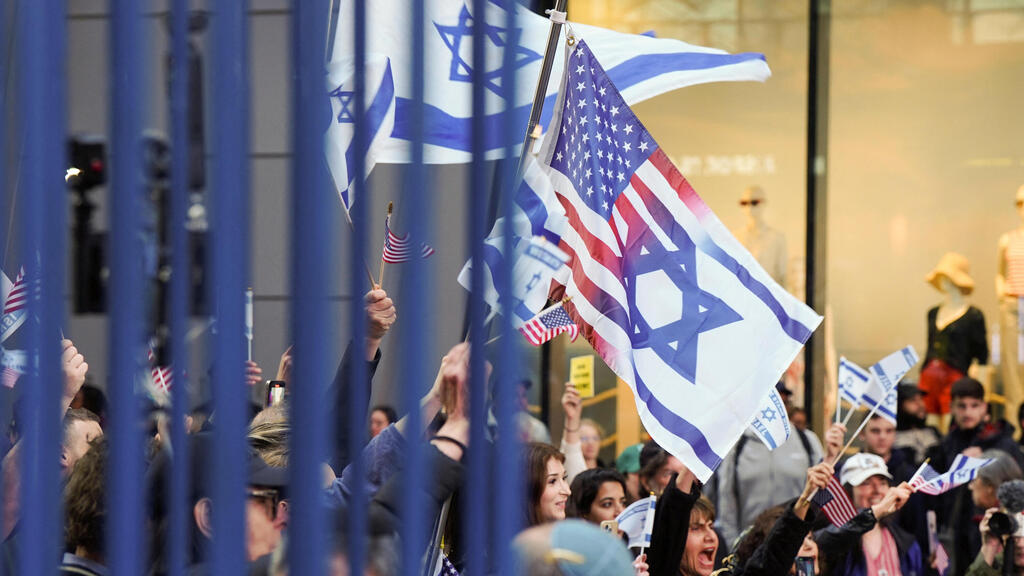Getting your Trinity Audio player ready...
A new study published by the Anti-Defamation League (ADL) reveals significant workplace discrimination against Israeli-Americans and Jews in the U.S. According to the research, Israeli-American job seekers are required to submit 39% more applications to receive the same number of positive responses as their Western European counterparts applying for identical positions.
For Jewish-American job seekers, the figure is 24% more applications. The city with the most significant disparity for Israelis is Seattle, the tech and coffee capital, home to major companies like Amazon, Microsoft, Costco and Starbucks.
3 View gallery


Significant discrimination against Israelis and Jews in US job market
(Photo: Reuters/Bing Guan)
The study, conducted by Dr. Brian Tomlin, an economist at California State University Channel Islands (CSUCI), was based on an experiment in which 3,000 job applications were sent for administrative positions. The applications included identical resumes, except for details revealing the candidate's origin— whether they were Jewish, Israeli or Western European. The results show that cultural or religious backgrounds can be a significant barrier to employment opportunities, even when qualifications are identical.
In addition to geographic differences, the study found that how information was presented on resumes had an impact. For instance, resumes with names strongly associated with Jewish or Israeli identities (e.g., "Lia Abraham" and "Rebecca Cohen") led to clear disparities in responses. Other factors, such as the use of Hebrew as a second language or listing an Israeli-associated workplace, contributed to the discrimination.
The study also revealed local variations. Israeli-Americans received notably better responses in cities like New York and Philadelphia, where their positive response rates were similar to or slightly higher than Western European candidates. However, researchers note that the differences were not statistically significant, making it unclear whether this was due to genuine openness or random employer patterns. In contrast, Seattle showed a particularly negative disparity, where Israeli candidates received only a 6.8% positive response rate, compared to 23.1% for Western European candidates. Researchers suggest further study is needed to understand the underlying causes.
3 View gallery


In Seattle, only 6.8% of Israeli candidates received positive responses to their job applications
(Photo: Shutterstock)
In most cities examined, Israeli-American and Jewish-American candidates faced some level of discrimination, though its severity varied across regions. In cities with higher unemployment rates, the disparities were more pronounced, likely due to increased competition for jobs, leading to more stringent candidate screening. Additionally, in cities with higher average salaries, Israeli and Jewish candidates were more likely to be rejected, hinting that employers in those areas tend to be particularly selective. These findings suggest that a combination of high competition and high wages may exacerbate discrimination against certain groups, even when candidates' skills and experience are equivalent.
Cities with the most noticeable bias against Israelis and Jews included Atlanta, Baltimore, Portland, Minneapolis, Washington, D.C., Chicago, Denver, Houston, Miami, Phoenix and San Diego. On the other hand, cities where Israelis and Jews were treated more equally or even favorably included Los Angeles, Austin, Dallas, Boston, Trenton, San Francisco, San Antonio and Las Vegas.
According to Tomlin, the data shows that Jewish and Israeli candidates are forced to prove themselves beyond typical expectations but are not treated fairly. "It is difficult, if not impossible, to prove discrimination in the job market—especially when it comes to Israelis or Jews, who are not defined as an ethnic minority group protected in the U.S.," he said.
"However, the findings show that people lose job opportunities because of their identity, not due to a lack of qualifications." The study also found that some employers who identified Israeli candidates responded in Hebrew or made direct references to their Israeli background, such as offering greetings like "Good luck!" In contrast, no similar responses were recorded for Jewish or Western European candidates. The researchers noted that this indicates employers view an applicant's Israeli background as significant, either positively or negatively.
Get the Ynetnews app on your smartphone: Google Play: https://bit.ly/4eJ37pE | Apple App Store: https://bit.ly/3ZL7iNv
The study underscores a broader trend of increasing antisemitic incidents in the U.S. According to the ADL, more than 3,000 antisemitic events, including physical assaults, property damage, and verbal harassment, were recorded in the first three months of 2024 alone.
Jonathan Greenblatt, CEO of the ADL, called the findings "unprecedented evidence of antisemitic discrimination in the job market." He added, "In addition to the rise in antisemitic incidents and beliefs, the study highlights the urgent need to combat prejudice against Jews and Israelis in the workplace. Beyond the legal aspects, organizations must recognize their social responsibility and ensure an inclusive work environment."



